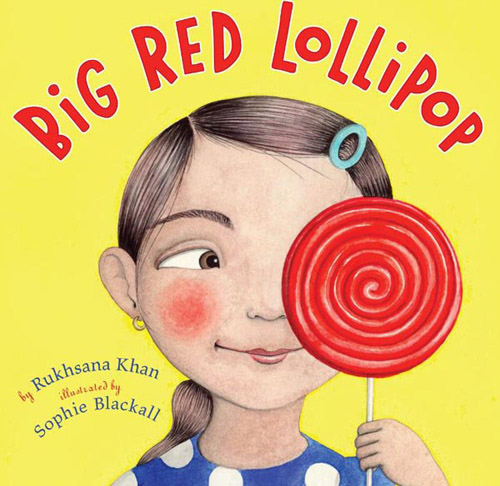By Anila Akram, Children’s book reviewer @mailatale
 Whether you like it or not, books with predominant South Asian characters are always going to be full of political and social messages – even kidlit. Themes of immigration or diaspora pervade even picture books, not just YA.
Whether you like it or not, books with predominant South Asian characters are always going to be full of political and social messages – even kidlit. Themes of immigration or diaspora pervade even picture books, not just YA.
Increasingly, I am beginning to fear that these immigrant stories, which were relevant for the past few decades, are now becoming outdated. These stories often focus on first generation immigration – and the problems we had with our parents when we were growing up in Canada. Now we have children and young ones of our own, and they face a whole new slew of growing pains.
This picture book, by Rukhsana Khan, makes a fascinating attempt at bridging that gap. Little Rubina is invited to her first birthday party, and her Ami insists that she bring her little sister along.
Rubina has no luck convincing Ami that no ones brings a little sister to a birthday party. So both girls go, and not only does little sister ruin the party, she also steals Rubina’s prized party favor: a giant red lollipop.
This is a surprising and fresh picture book, with charming illustrations by Sophie Blackall. It won the 2011 Golden Kite award for best picture book, as well as the 2011 Charlotte Zolotow award for best picture book. But as you might guess from other reviews, you’ll either really hate this book, or really love it. One thing is for sure: it’s a book that requires a significant convo with your kids, before and after reading it.
When Rubina complains about Sana’s theft, she is lectured about sharing and forgiveness. Several years later, Sana is invited to her own birthday party, and Ami insists that Sana take their new younger sibling Maryam. But big sister Rubina now steps in, and with compassion and empathy, and convinces Ami to let Sana go to her party on her own.
One thing that has struck a lot of people when reading this picture book is that Sana’s rudeness at the party goes completely unaddressed by the author. They worry that it’s a book that doesn’t teach fairness and respect, and instead preaches obedience to old-fashioned thinking. However, as soon I read this book, along with some of the critiques, it occurred to me that maybe Khan wrote this book for the parents – not for to children at all. The children of us Masalamommas don’t really have to deal with parents like Ami – but we did. The more I think about that, the more I realize that maybe this book doesn’t teach Rubinas to forgive Sanas – it teaches Rubinas to forgive Amis. Rubina shouldered much of her parents’ fear of assimilation, but she had the compassion to ensure that her sisters did not go through the same thing. Standing as a buffer between her parents and her younger siblings, she was able to gently help Ami see that their family could adapt in a new home, without losing their principles.
So I urge you to give this book a chance – it will really get you thinking about the problems you may have faced growing up, and the new issues that our kids, the Sanas and the Maryams of the world, are going to encounter in the coming future.
Happy Reading!

Anila Akram
Great children’s book boxes – Mailatale.ca



There are no comments
Add yours